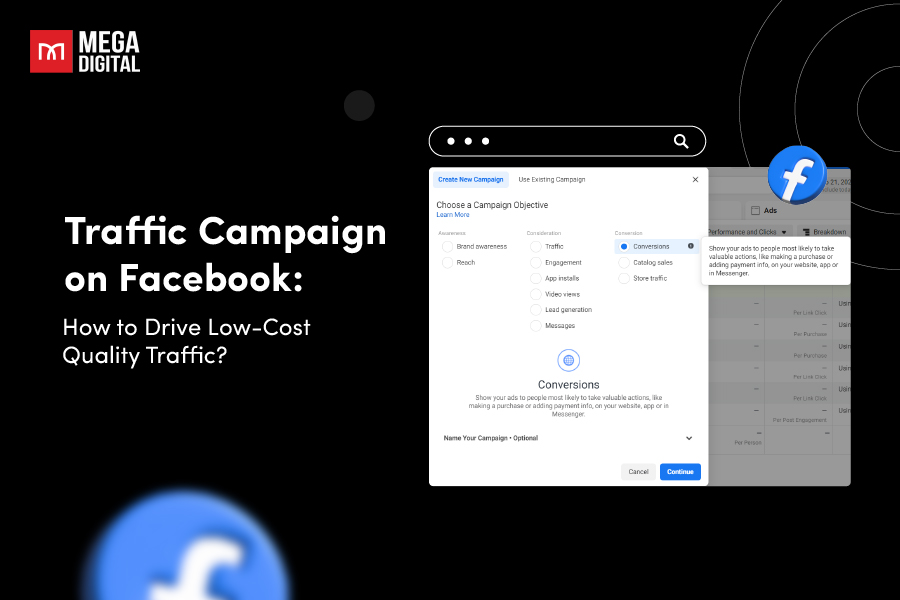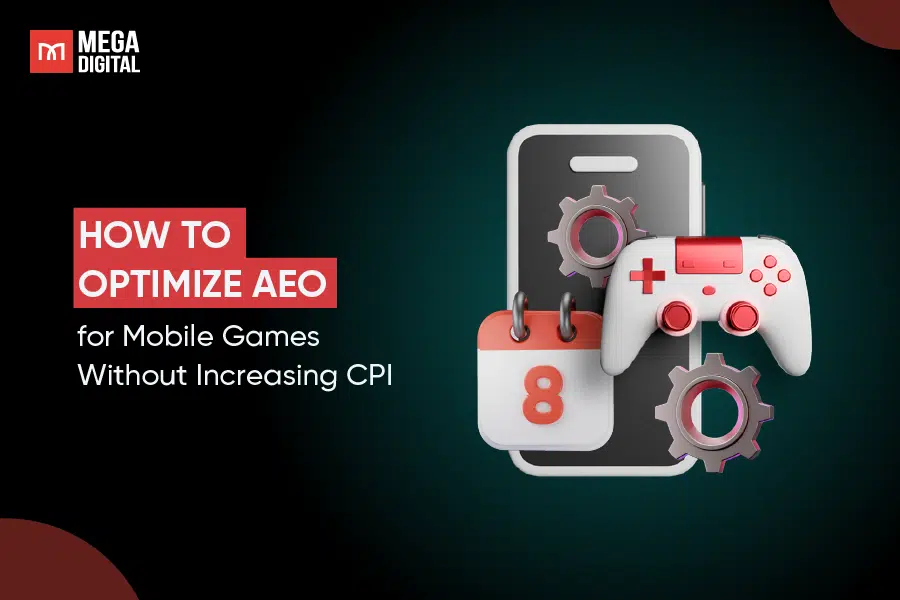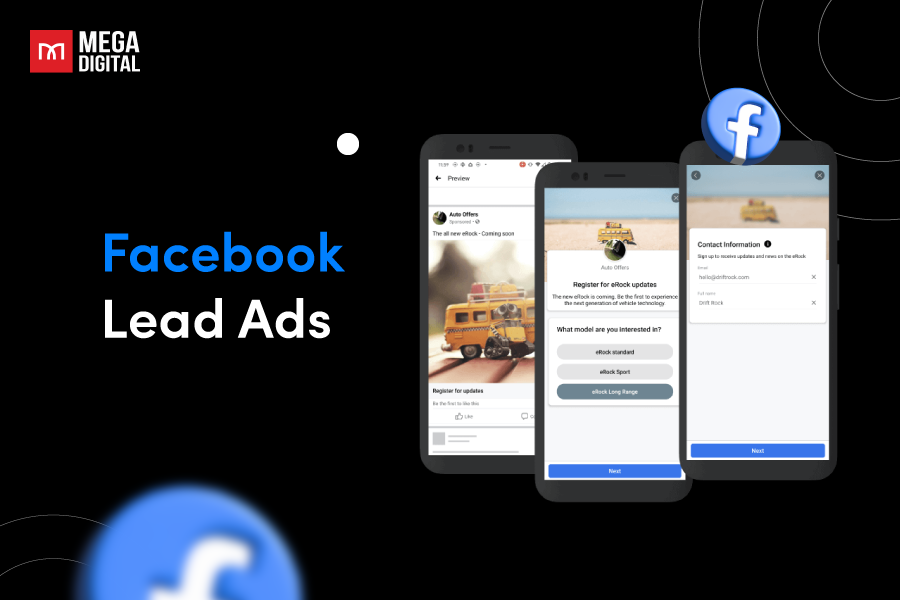Facebook Relevance Score is a crucial metric for advertisers to measure and analyze user experience. It helps you understand the audience’s reaction to your ads and determines which ads are valuable and cost-effective to display. I will show you how to view and improve this metric to maximize ad relevance in this article.
What is the Facebook Relevance Score?
The Facebook Relevance score (Quality Ranking) is an ad rating system on a scale of 1 to 10. 10 shows your Facebook ad resonates best with your target audience, and 1 is the opposite.

How is the Relevance Score in Facebook Ads Calculated?
By understanding the factors that Facebook’s algorithm uses to calculate the relevance score, you can analyze where your ad is facing issues. From there, you can create more impactful ads and achieve better results.
The Requirement for Visible Facebook Ad Relevance Score
If your Facebook Ad Relevance score does not show up in the dashboard, it is because your ad does not match the amount of delivery times.
According to Facebook, the Facebook Ad Relevance score is only visible if your ad is delivered at least 500 times. This number will help Facebook Machine Learning calculate the average score of your ads based on the audience interaction.
Factors Affecting Facebook Relevance Score
The Facebook Relevance Score is evaluated based on 4 factors:
- Target Audience: How well does your chosen target audience align with the content of your ad? The more specific and relevant your targeting, the higher your score will likely be.
- Campaign Objective: Whether your ad effectively supports the specific goal you’ve chosen for your campaign.
- Ad Relevance & Freshness: Facebook wants users to see interesting and engaging content, so outdated or repetitive ads will be penalized.
- User Feedback: This is all about how users react to your ad.
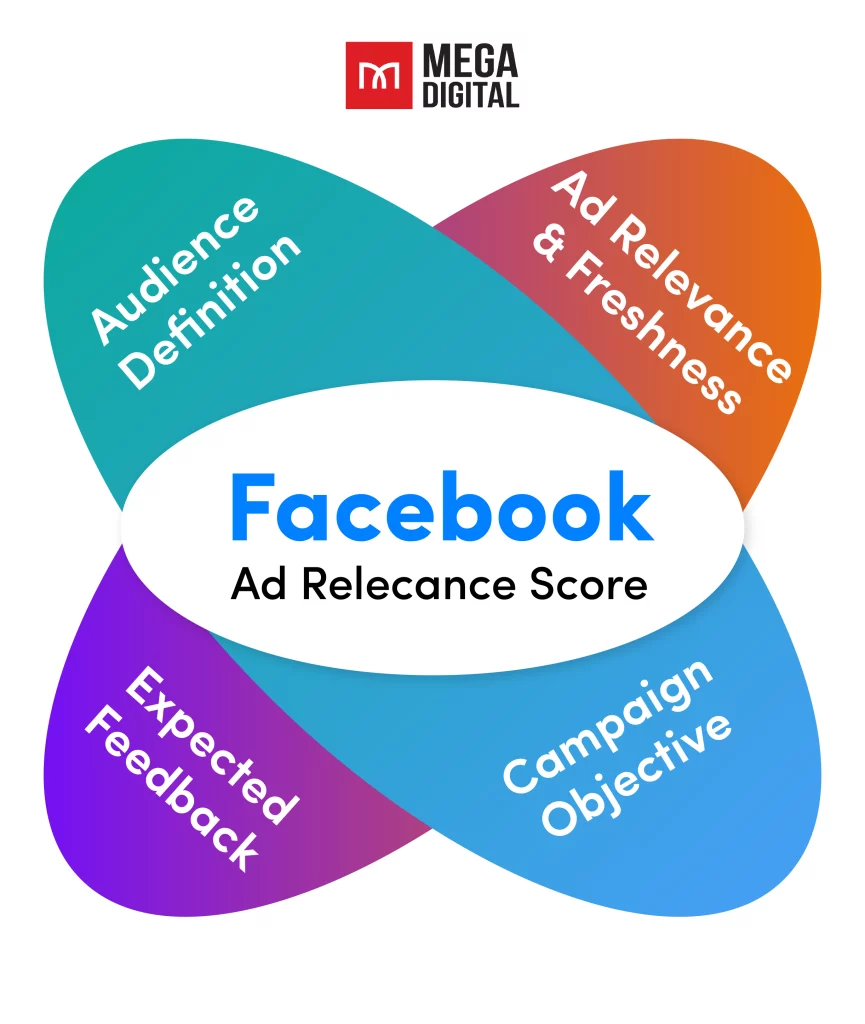
The Facebook Ad Relevance score is just an indicator of how your ads match the audiences. So, besides the ad setting and targeting, I will explain the user feedback factor in more detail because it affects most of your score, and we cannot control it.
Therefore, there are two types of user feedback which are positive and negative feedback.
- Positive Feedback: This encompasses actions such as clicks, conversions, and engagement. Positive interactions with your ad elevate your relevance score.
- Negative Feedback: Actions like hiding the ad, reporting it, or providing negative reactions can decrease your relevance score.
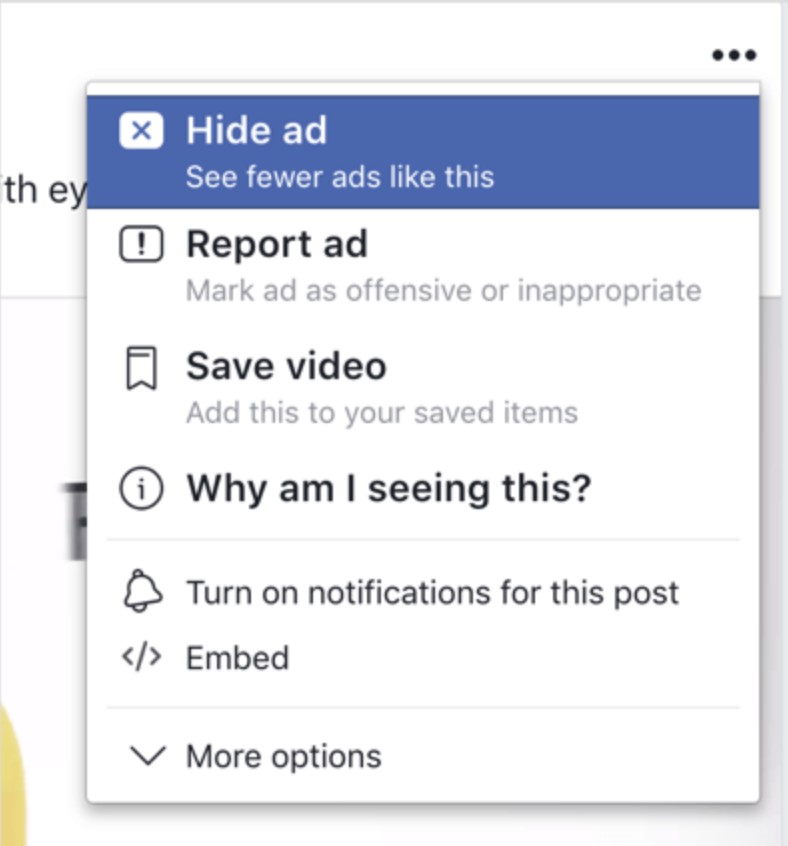
Example of How Facebook Relevance Score is Evaluated
All the above is just a theory. Now, let’s get on the practical, where I will show you some real examples of how this affects your ads.
Here are three advertisements for a women’s handbag product with different Facebook relevance scores. What did the advertiser improve in each ad?
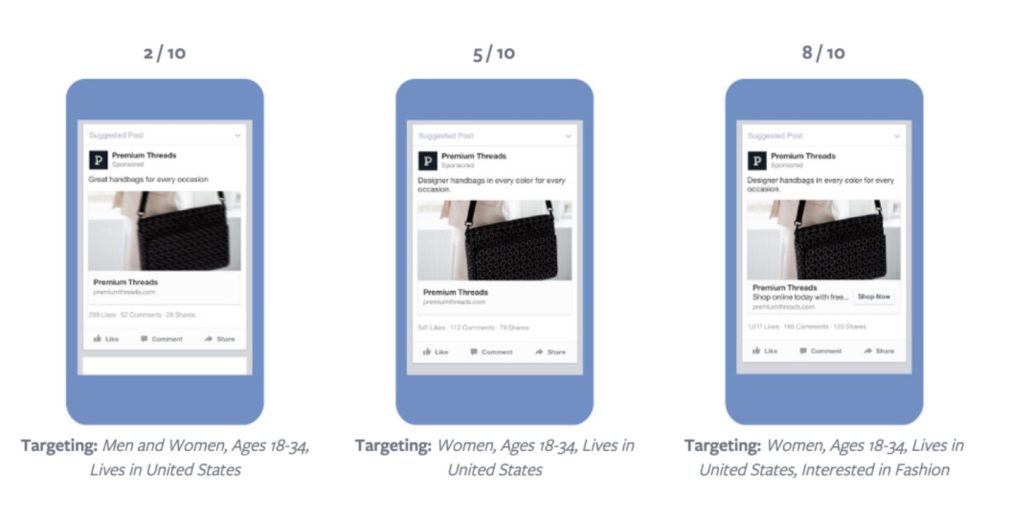
Ad 1:
- The target audience is too broad, targeting both men and women despite being a women’s handbag.
- Additionally, there is no clear call-to-action (CTA) to guide user action.
- The image and content lack investment, making the ad generic, and people do not take any action on it.
Therefore, the ad score is low: 2/10.
Ad 2:
- The target audience is narrowed down to women.
- The content has been improved to showcase the features and utility of the handbag.
- However, without a CTA, user interaction is still relatively low.
Therefore, the score is 5/10.
Ad 3:
This ad scores 8/10 because it has been improved in the following ways:
- Targeting ages 18-34.
- Targeting female customers.
- Focusing on the fashion-interested audience.
- Including a “Shop now” call-to-action button.
These examples show that identifying a specific target audience, describing detailed products, and providing clear guidance for buyers will significantly increase the ad score.
Of course, this is just an example to help you understand how the Facebook Relevance Score is calculated. Here are some key notes to help you apply this to your ads.
Keynotes:
1. Setting ads correctly will help you get at least 5 out of 10.
2. Improve your ad copies and creatives will get you a higher score.
Why is Facebook Ad Relevance Score Important?
Understanding relevance scores helps advertisers in several key ways:
Know how good your ads
Because your relevance score is primarily based on audience feedback and interaction with the ad, a high relevance score means that your ad copy and creativity are effectively engaging viewers. Conversely, a low relevance score indicates that you need to improve the ad to better suit your customers.
Reduce wasted ad budget
You can understand that the Facebook Ad Relevance score is like an overview of the metrics of your ads. So, improving Ad relevance score is similar to optimizing all the key metrics of your campaign, such as CPC, CTR, CPM, etc. If you know nothing about Facebook Ads, just look at this indicator, and you will know if your ads are performing well or not.
To prove the relationship between the Facebook Ad Relevance Score and other metrics, take a look through AdEspresso’s study.
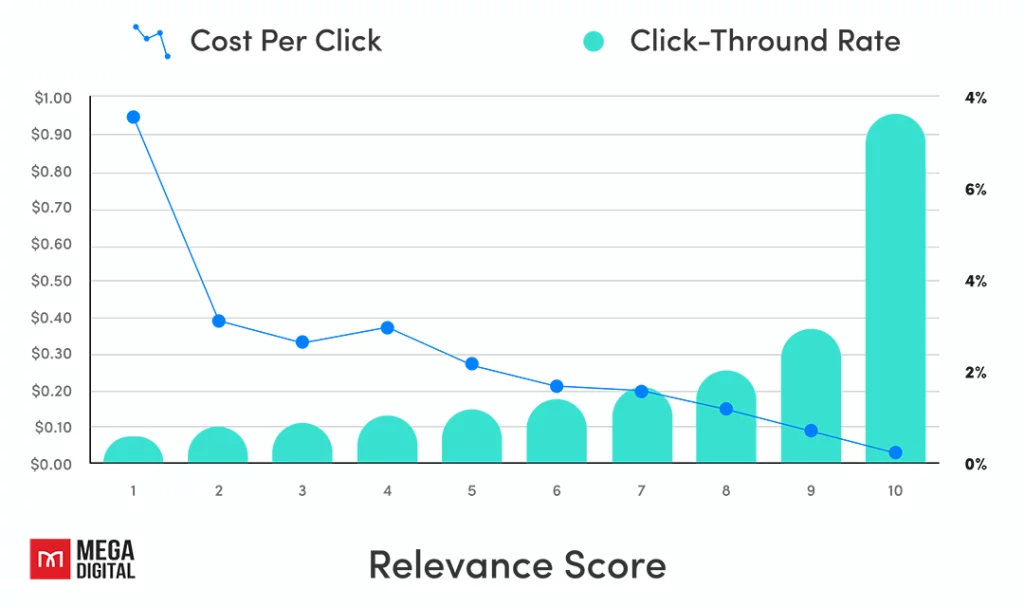
Looking at the chart, we can see that the CPC for ads with low relevance scores is much higher than ads with relevance scores of 9 or 10. Especially, CPC dropped significantly when the relevance score increased from 1 to 2 points.
Next, it is a detailed table of Facebook relevance scores and their corresponding ad costs:
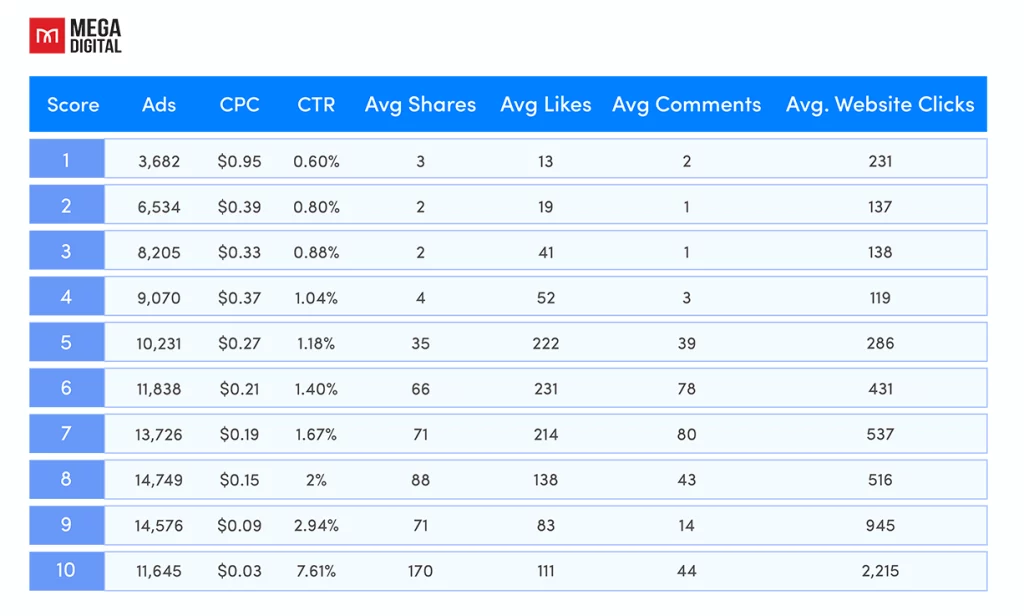
So, what do these results tell us about the average relevance scores?
- A relevance score of 1 will harm your campaign’s ROI.
- If you have a score of 2 – 5, you are targeting the right audience, but your ad creative is not good enough compared to other competitors.
- A relevance score of 6 – 8 shows you that your ad creative is good and the setting is correct. However, you will need to consider your budget to reach more audiences.
- A score of 9 – 10 is not uncommon for campaigns with precisely targeted audiences and ads relevant to those audiences. This score will yield the best ROI for your ad campaign.
>>> Explore more: Facebook Ads Benchmarks for 19 Industries: What Experts Say?
What is A Good Relevance Score for Facebook ads?
As per the data from the AdExpress study I provided earlier, after analyzing over 104,000 Facebook ad campaigns, the average relevance score falls within the range of 6 to 10 points.
Therefore, any score above 5 is considered a good relevance score on Facebook Ads.
How to Check Your Facebook Ad Relevance Score
If you’ve received over 500 impressions but still can’t view it, here are 5 steps to check your Facebook relevance score:
Step 1: Open Facebook Ads Manager.
Step 2: Choose a campaign.
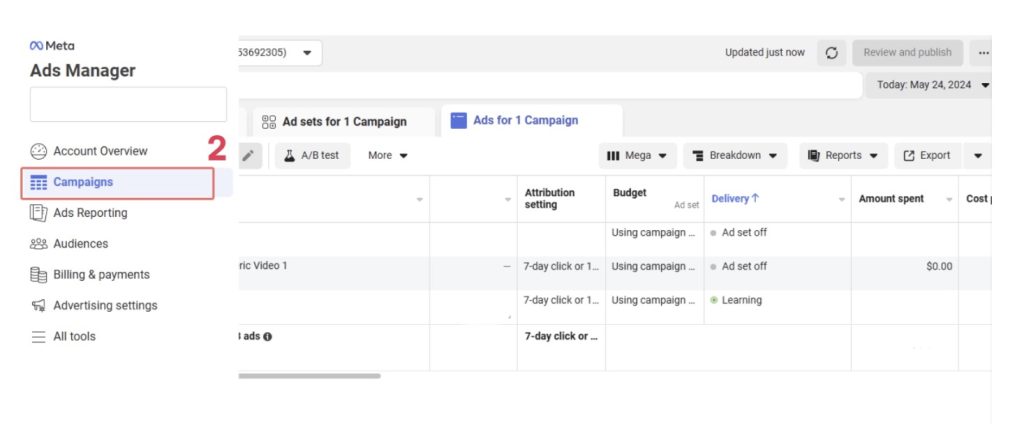
Step 3:
- Select an ad group
- Choose an ad within that ad group
- Click on the Columns drop-down menu
- Select Customize Columns
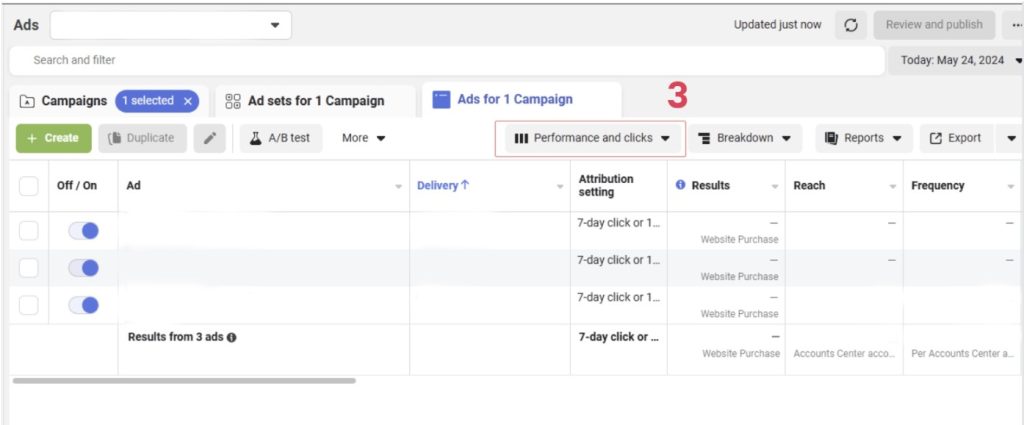
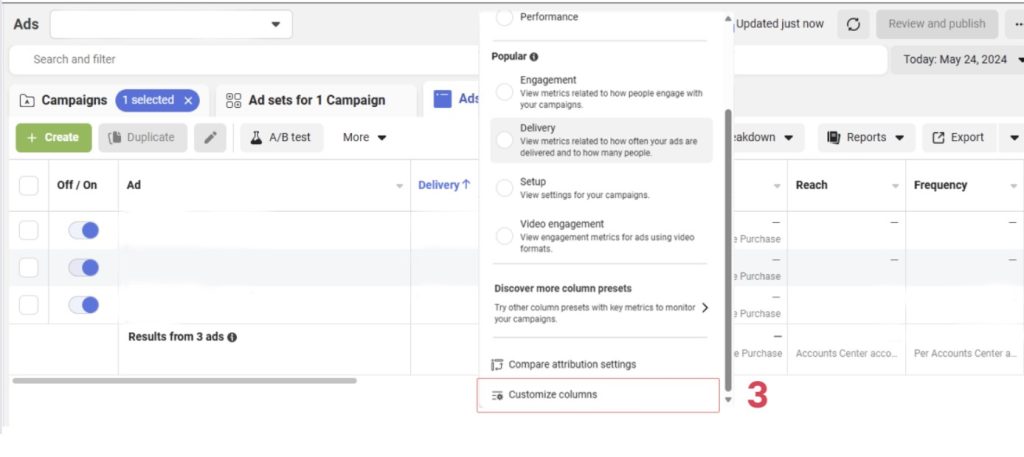
Step 4: Scroll to find the column labeled “Quality Ranking”
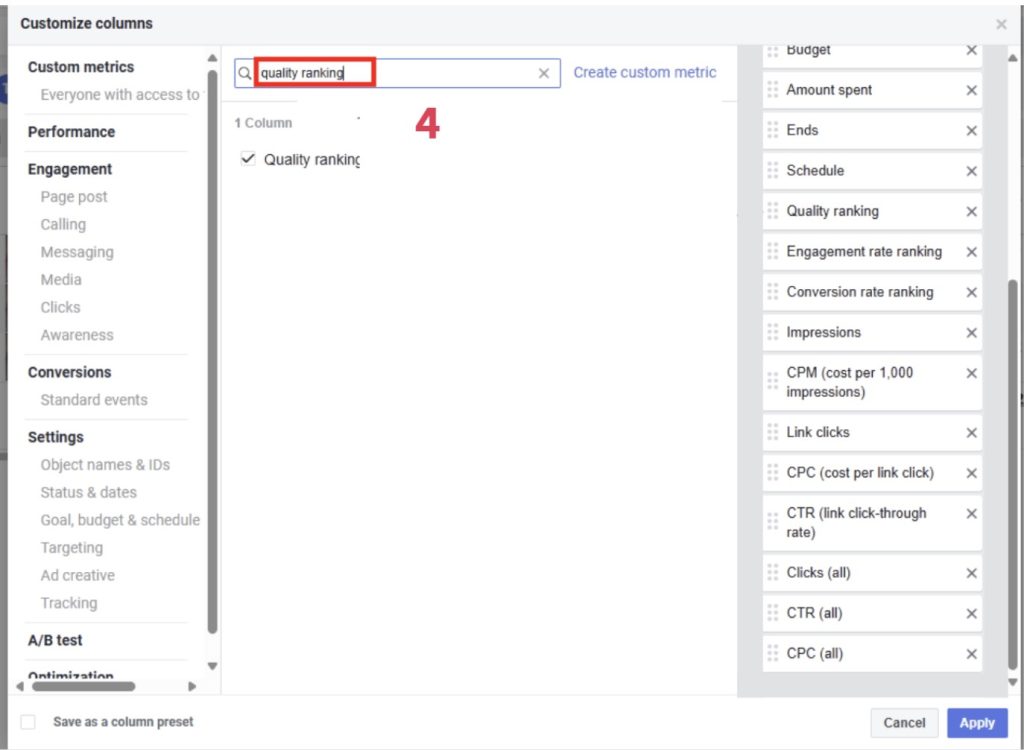
Step 5: Check 3 key metrics: Quality ranking, Engagement ranking, Conversion rate ranking
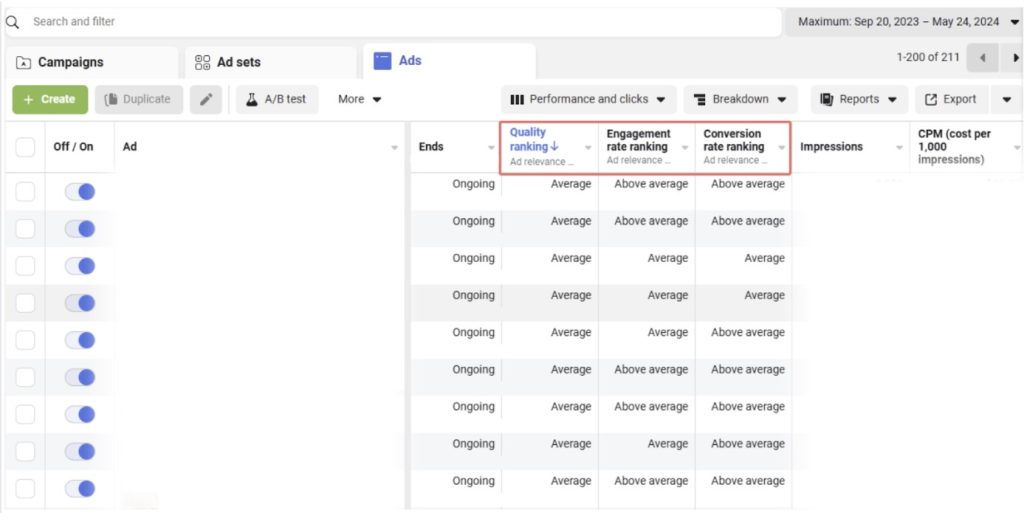
3 Ways to Improve Facebook Relevance Score
For an ad to have a high Facebook ad relevance score, it needs to have the following 3 factors:
- Accurately identify your target audience
- Align your advertising objectives for each campaign
- Create interesting content ads for your customers.
It may sound complex, but applying the 3 methods I’ve used to improve relevance scores for over 10,000 large and small clients makes this task much easier.
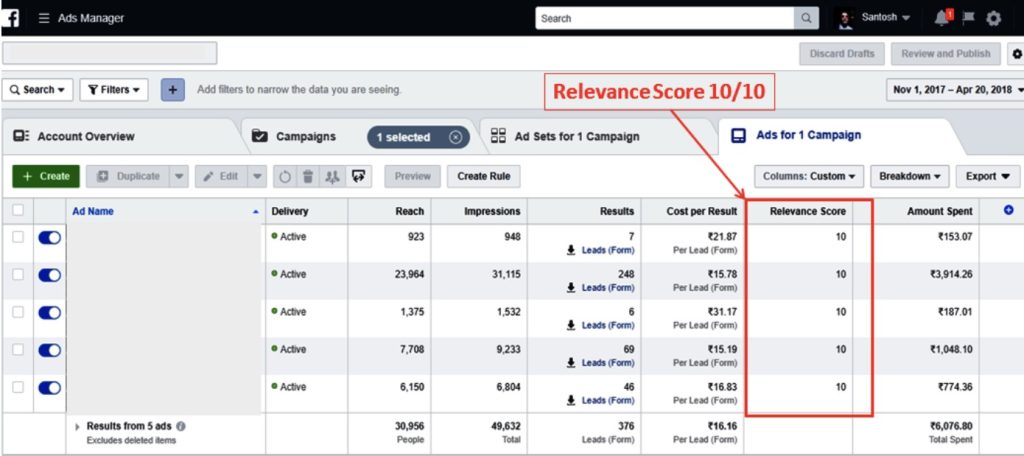
Ad Targeting
Targeting is a critical aspect that can determine the success or failure of your Facebook ad campaign. So, you should apply my 5 tips to target correctly and effectively.
Target the right audience
Without a clear understanding of your audience, creating relevant advertisements becomes challenging.
Questions like where they live, their age, interests, and purchasing behavior are crucial. In particular, you need to identify the daily challenges and desires of customers using your product or service. This will help you easily select the appropriate customer segment on Facebook.
Additionally, utilizing tools like Audience Insights can help analyze Facebook users or those connected to your Facebook page, providing valuable information for improving targeting.
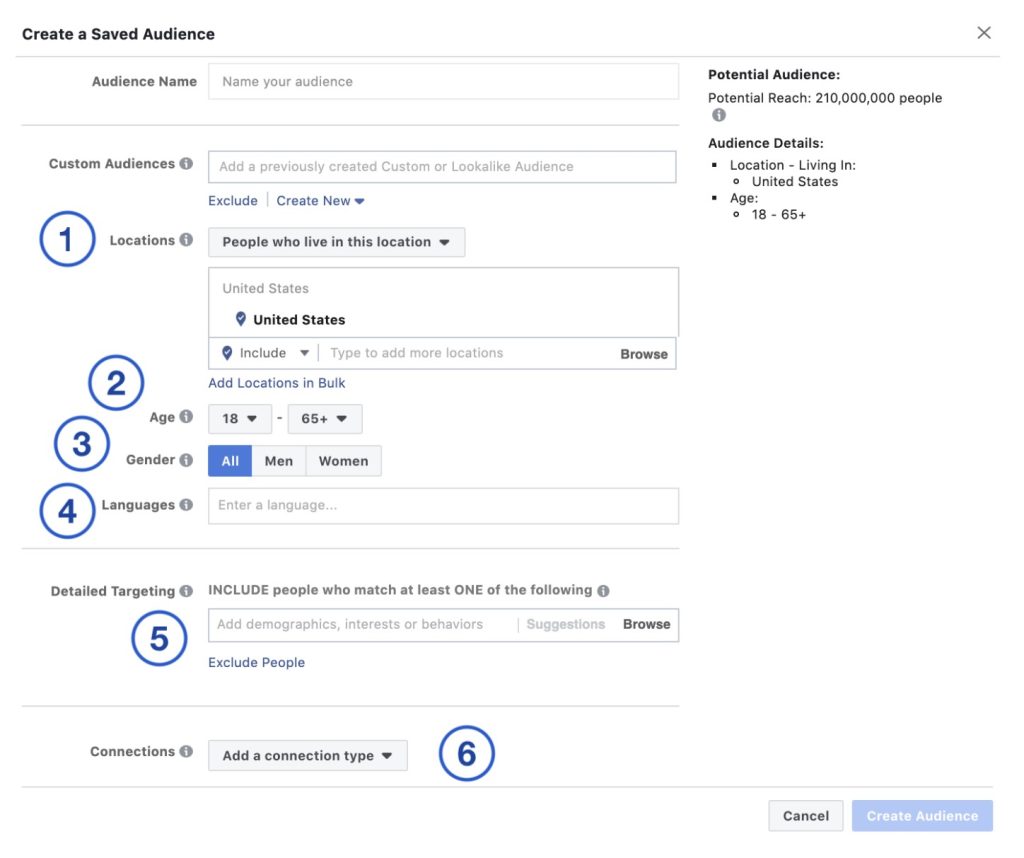
Target a broader customer group
Don’t narrow down your target audience too much.
The first thing Facebook does when you start a new ad is to understand your target audience and find those most likely to take the desired action – the learning phase.
So, if you provide Facebook with more audiences to track, it will broadly target Facebook ads to find users with high conversion rates.
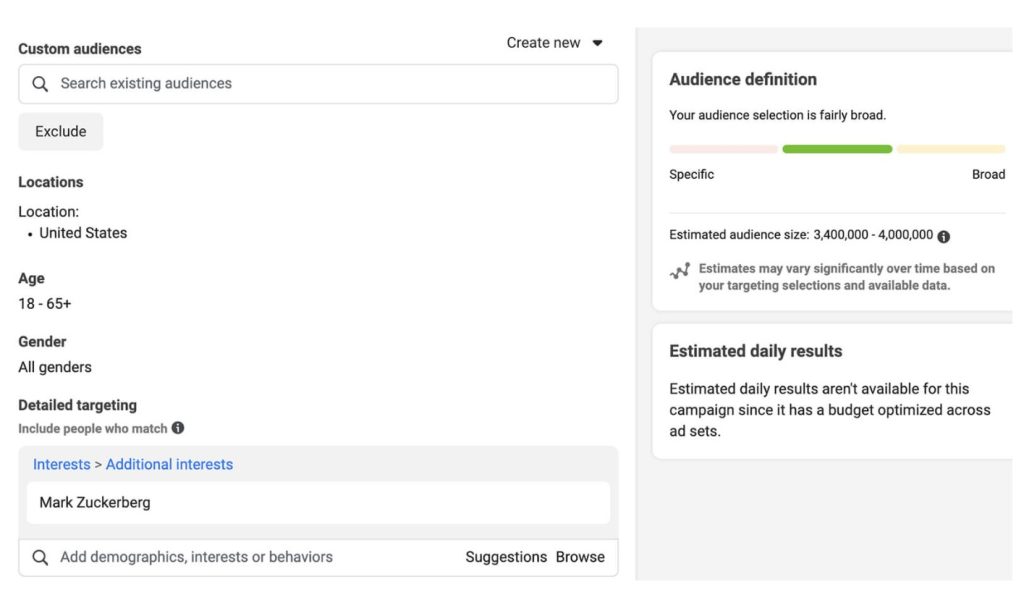
Therefore, try to target a broader customer file if your ad score is low and your target audience is limited.
The best targeting is no targeting
Facebook applies machine learning in distributing Facebook ads. Machine learning understands user behaviors and demographics. Therefore, it will distribute ads more effectively.
So, sometimes, targeting is less effective than not targeting anything at all. Especially in cases when your budget is small, not targeting anything can help you avoid competing with advertisers with larger budgets while still being able to reach the right target audience.
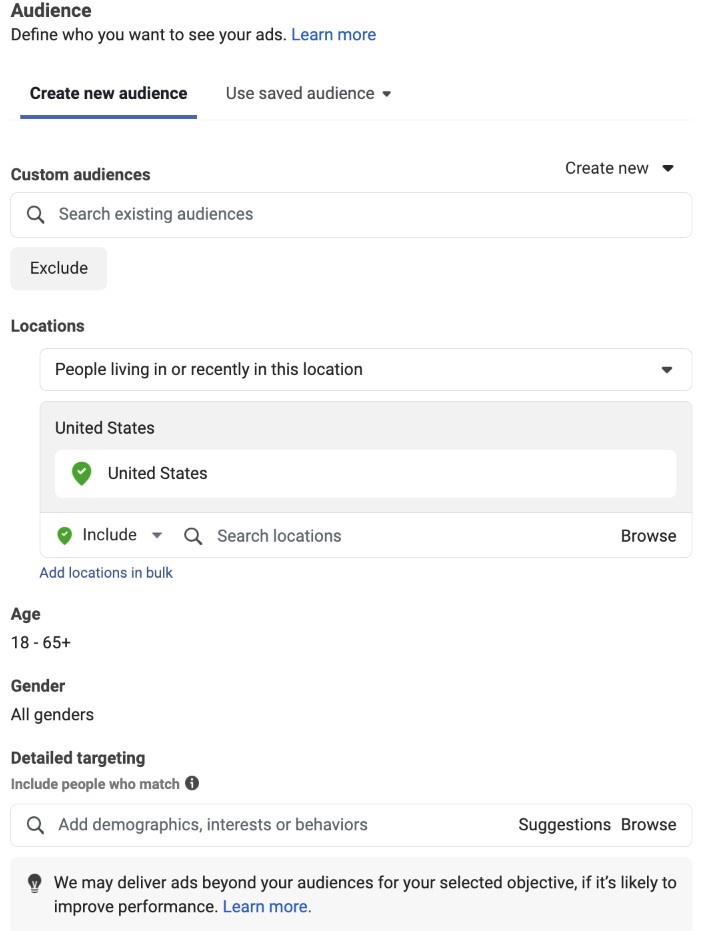
Create Custom Audience
Facebook Custom Audience is a powerful tool for advertisers that allows you to target your ads to specific groups of people who have already had some interaction with your business.
You just need to identify which of the following cases you fall into and follow my instructions. By doing so, you will be able to master how to create and use custom audiences effectively to increase your relevance score.
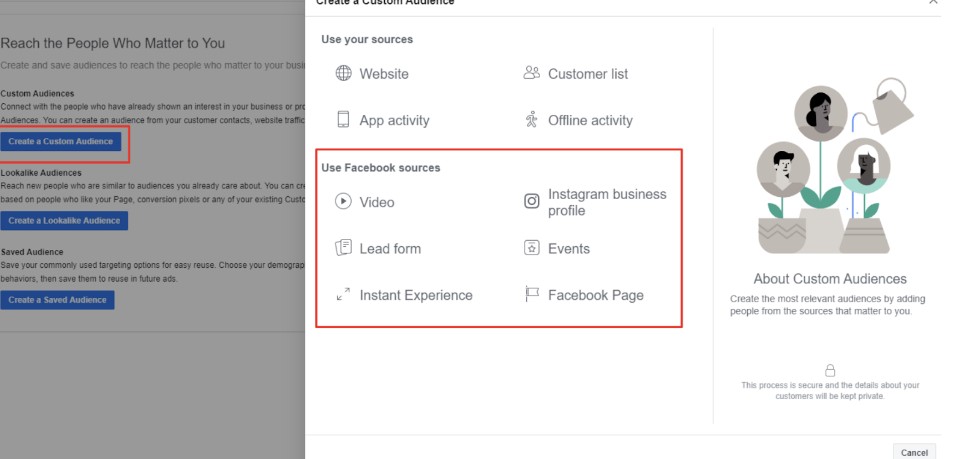
Case 1: Audiences have interacted with your ads
People interacting with your ads means they are interested in your ads, so reaching out to these people will result in a higher relevance score and better conversions.
When creating this custom audience set, you should note that:
- Ensure the audience is at least 200 people to create a separate campaign.
- Your ads should delve deeper instead of reusing the same ads they have seen.
For instance, if you are advertising a product, the subsequent ads should highlight the features of that product more clearly or offer better incentives. This approach stimulates the customer’s purchase intent more and more, and they might decide to buy the product.
You can categorize these customers as follows:
- Visited your Facebook page.
- Interacted with your post or ad.
- Clicked on the call-to-action button.
- Sent messages to your page.
- Saved your page or post.
Case 2: Audiences have converted
People who have used your service or purchased your product may feel annoyed if they continue to see your ads. Negative feedback from these users will significantly affect your relevance score.
Therefore, you need to create a custom audience to exclude this group from your ad campaigns.
Furthermore, by excluding those who have converted, your budget will only be used for those who have not yet converted, helping to optimize your CPC.
Here is how to exclude people who have converted from your audience:
- First, create a custom audience that includes people who have successfully converted by being redirected to the thank you page.
- Use the EXCLUDE function when setting up your ad to exclude people who have successfully converted.
Exclude Clone or Fake Accounts
One of the common “annoyances” when running Facebook ads is dealing with fake or clone accounts. While there’s no way to completely eliminate these accounts, cleverly applying the following 3 methods can significantly improve your ad performance.
Method 1: Exclude Fake Accounts
Fake accounts often include newly created profiles. You can exclude these accounts by using exclusion targeting based on the age of the mobile device:
- Less than 1 month
- 1 – 9 months
Method 2: Exclude Other Advertisers
Depending on your service or product, you might want to exclude other “advertisers” like yourself. Here are some specific groups you can exclude:
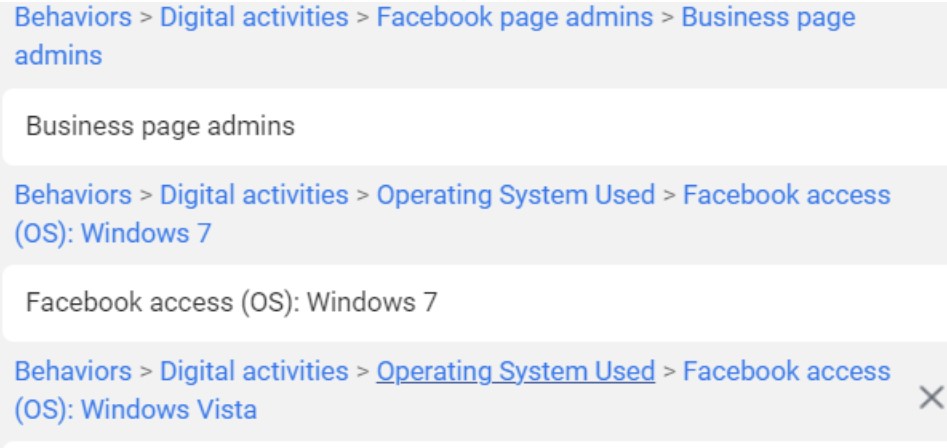
- Admins
- Facebook Page Admins (including anyone managing a fan page on Facebook)
- Admins by Field (business, sports, travel, health & beauty, etc.)
- New Page Admins (newly established fan pages)
- People Who Have Paid Facebook (generally, only advertisers need to pay Facebook)
- Users Who Paid in the Last 30 Days
- Users Who Paid in the Last 90 Days
Method 3: Exclude Based on Demographics
Depending on the product or service you are selling, you might consider excluding certain demographics. These could include marital status, education level, job industry, etc.
Examples:
If your product is targeted at individuals with high income and education levels, you might exclude:
- High school graduates
- Current high school students
- Specific high schools
By using these exclusion targeting methods, you can ensure your budget is better utilized by reaching a more relevant audience, thereby optimizing your CPC and improving your ad performance.
Ad Copy
As an advertising expert, crafting compelling Facebook ad copy is crucial for improving engagement and driving conversions. To improve it, I will provide you with the following two formulas. With these formulas, my team of experts at Mega Digital has enhanced ad copy for thousands of large and medium-sized businesses around the world.
AIDA Formula
AIDA formula is highly effective for mobile devices. Here’s a detailed guide on how to apply this formula to your ad copy:
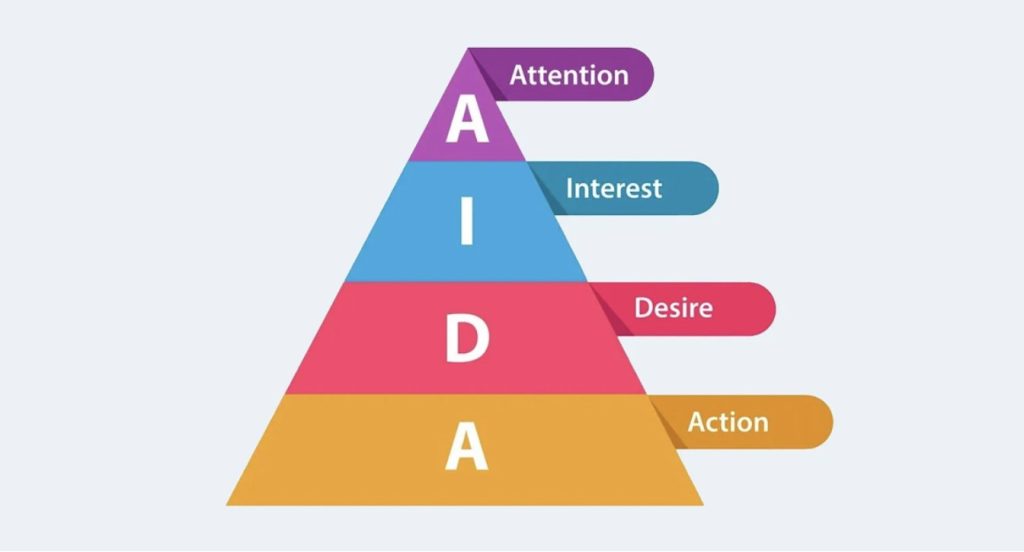
To create compelling ad copy using the AIDA (Attention, Interest, Desire, and Action):
- Attention: Start with a persuasive title that immediately grabs attention by addressing a common problem or highlighting an enticing benefit.
- Interest: Follow this with a short description that piques interest by explaining how your product or service can benefit the viewer.
- Desire: To build desire, list key benefits, focusing on what sets your product apart.
- Action: Conclude with a clear and direct call-to-action that encourages immediate response.
Note
- Ensure that the ad copy includes content not already present in the image.
For example:
- Attention: Discover the ultimate solution to effortless gardening!
- Interest: Tired of spending hours in the garden? Our innovative tools make gardening a breeze.
- Desire:
- Save up to 50% of your time with our easy-to-use tools.
- Ergonomic design reduces strain and fatigue.
- Durable materials ensure long-lasting performance.
- Free instructional guide with every purchase.
- 24/7 customer support for all your gardening needs.
- Action: Order now and transform your garden today!
PAS Formula
PAS (Problem-Agitate-Solution) formula is designed to captivate your audience, evoke emotional responses, and provide a clear solution. Here’s how to apply it effectively:
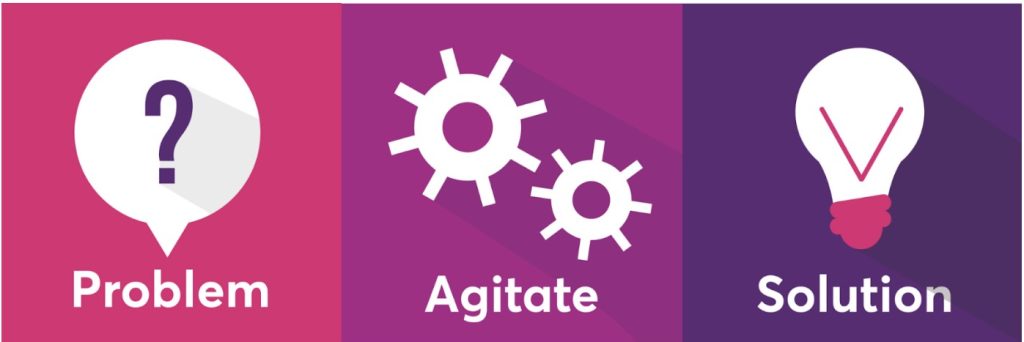
Creating engaging ad copy involves effectively utilizing the PAS (Problem, Agitate, Solution) formula to capture and maintain your audience’s attention.
- Problem: Start with a title that hooks the viewer by addressing a common issue or pain point.
- Agitate: Craft a short description that delves into the problem, making it relatable and urgent.
- Solution: Present your solution clearly and concisely, emphasizing the benefits and effectiveness of your product or service.
Note
- Ensure that the ad copy includes content that is not already present in the image.
For example:
- Problem: Struggling with sleepless nights? Discover the secret to restful sleep!
- Agitate: Millions suffer from insomnia, tossing and turning every night. Don’t let another sleepless night ruin your day.
- Solution: Our all-natural sleep aid promotes deep, restful sleep without any side effects. Say goodbye to restless nights and hello to refreshed mornings.
Ad Creative
A beautiful ad creative that resonates with your target audience can indeed drive engagement, leading to a higher relevance score.
Leverage Social Trends
Incorporating current trends makes your ad relevant and relatable, capturing users’ attention.
How to do it?
- Keep an eye on memes, cultural references, and trending topics.
- Follow industry news and social media updates.
- Create ad content that aligns with popular trends.
- Use relevant hashtags or references to ongoing events.
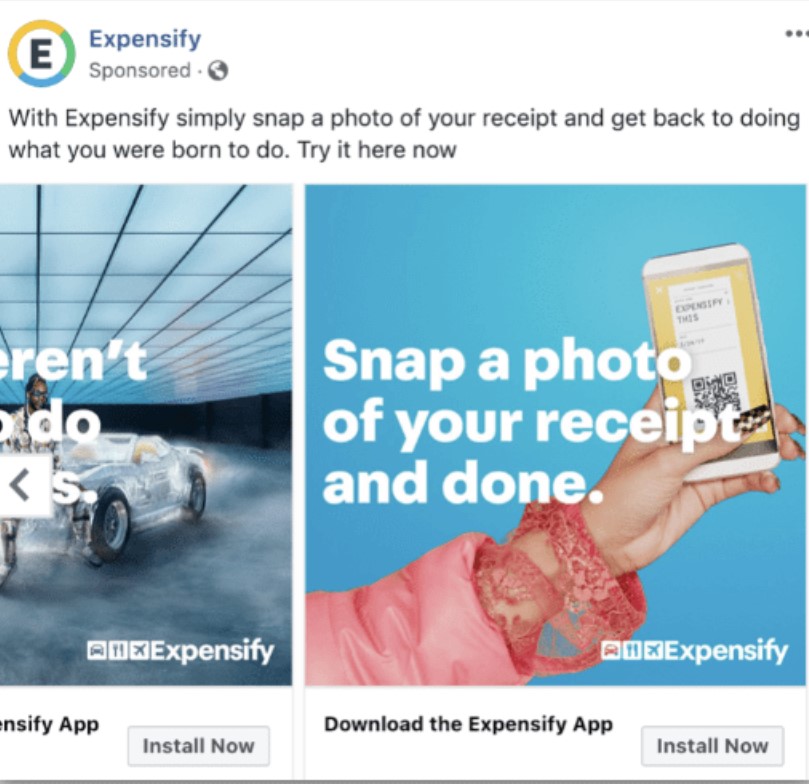
Use Vivid Colors
Eye-catching colors grab attention and make your ad stand out in a crowded feed.
How to do it?
- Choose colors that align with your brand identity.
- Maintain consistency across all your creatives.
- Experiment with color combinations to find what resonates best with your audience.
- Consider cultural associations (e.g., red for urgency, green for health).
- Consider using contrasting color combinations to make your ads stand out in users’ feeds. Test different color schemes to see what resonates best with your audience.
User-Generated Content (UGC)
UGC is a hot trend in 2023. Encourage your customers to share their experiences with your product or service. UGC adds authenticity and builds trust.
How to do it?
- Run contests or campaigns that encourage users to share their experiences.
- Ask for reviews, testimonials, or user-generated photos.
- Feature UGC in your ads.
- Share customer stories or showcase their content.
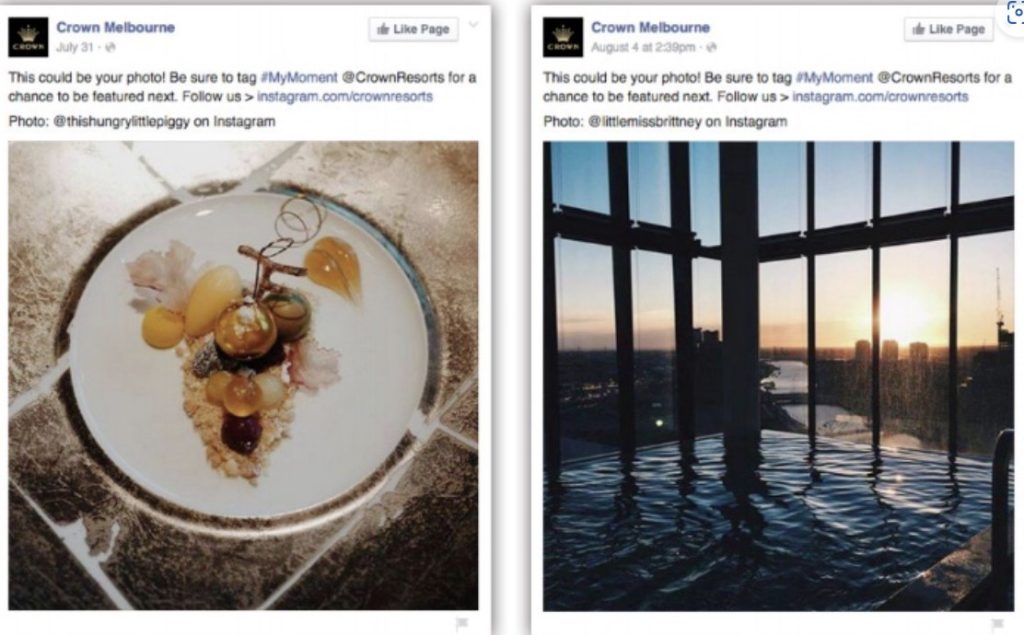
>>> Explore more: 15 Proven Strategies to Optimize Facebook Ads for Maximize ROI
Final word
I hope that this post has helped you know more clearly about Facebook Relevance Score and how to check and improve it in detail. However, if you are still struggling with doing Facebook Ad Relevance, don’t hesitate to drop a message by clicking the button below. Our agents will reach out and consult with you personally regarding your case.







